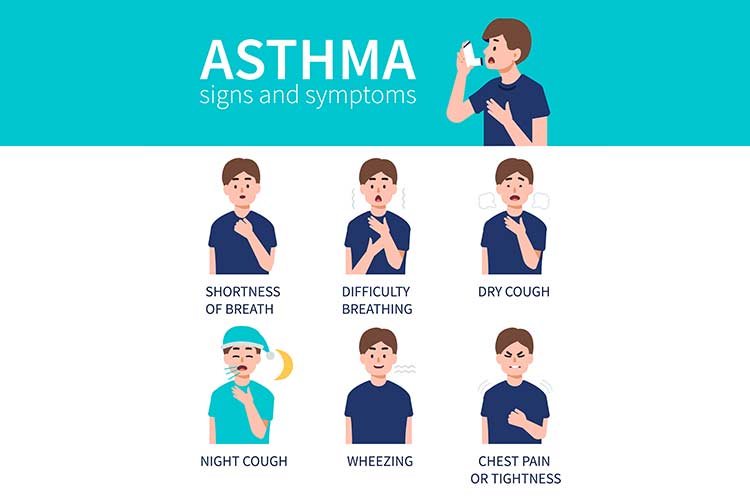Join Our eNewsletter!
Subscribe to our monthly newsletter to receive encouraging advice to help you lead a healthy lifestyle.

Clearing the Air About Asthma
Asthma is a chronic respiratory condition affecting more than 25 million people across the United States, including 5 million children. Even though asthma is a common condition, there are still several misconceptions and misunderstandings about what it is and how best to treat it.
Understanding asthma and how to manage it can be the difference between life and death.
What Asthma Is and What Causes It
Asthma is described as chronic inflammation in the lungs, which results in the swelling and narrowing of the airway and triggering various uncomfortable symptoms, including coughing, wheezing, difficulty breathing, and tightness in the chest. As a chronic condition, asthma doesn’t go away and requires ongoing medical treatment.

While researchers continue to study what causes asthma, they do know there are several variables that may predispose someone to develop it, including:
- Family history: Genetics plays a role. If you have a parent with asthma, you are three to six times more likely to develop it.
- Allergies: People who develop asthma sometimes have other allergic conditions such as eczema or hay fever.
- Viral respiratory infections: If you have respiratory problems as an infant or in childhood, such as respiratory syncytial virus (RSV), the chances of developing asthma later in life increase substantially.
- Occupational exposures: Certain exposure to elements in the workplace can cause asthmatic symptoms, including exposure to particular dust, chemical fumes and vapors, and mold.
- Smoking: Smoking and exposure to second- or even third-hand smoke increases the likelihood of developing asthma.
- Air pollution: Polluted air and asthma go hand in hand. Constant exposure to smog and growing up in urban areas can increase the risk of developing asthma.
- Obesity: Adults and children who are overweight or obese are at risk of developing asthma. While still unclear, evidence suggests that the level of inflammation that occurs in the body when someone carries extra pounds may lead to an asthma diagnosis.
For those with asthma, certain triggers might bring on an attack, including exposure to pet dander allergies, cleaning products, and even bouts of cold air.
Debunking Common Myths About Asthma
Now that we have discussed what asthma is, why someone may be more prone to developing it, and what triggers an asthmatic attack, let’s address some of the most common myths and misconceptions about the condition:
- You outgrow your asthma: If you are diagnosed with asthma in childhood, you don't “outgrow” the disease. While the diagnosis is most common among the pediatric population, the condition never goes away. Symptoms and frequency of attacks may lessen, but having asthma means you will have to live with it for the rest of your life. Also, while most cases of asthma occur in childhood, it is possible to be diagnosed at any age.
- Asthma is "all in your head”: Because asthma is often linked to mental conditions, such as anxiety and depression, a common myth about asthma is it’s purely psychological. However, while these mental disorders might make asthma more challenging to manage, it is a disease that impacts the lungs and the effectiveness of your airways.
- Asthma medications are addictive: Inhaled corticosteroids are the most common asthma treatment. However, when prescribed and used as directed, they are safe and effective in managing the symptoms of asthma attacks.
- People with asthma shouldn't exercise: While exercising may result in an occasional asthma flare-up, it's been shown that physically active people are 2.5 times more likely to avoid an asthma attack. In addition, exercise programs designed to improve lung function have been linked to improved quality of life and few asthma symptoms.

How To Manage Asthma
Understanding the misperceptions about asthma is essential to leading a healthy and productive life with it. In addition, there are several other steps you should take to make the condition more manageable, including:
- Working with your healthcare professional: If you suspect you or a loved one has asthma, consult your healthcare provider. They can provide an accurate diagnosis, develop a treatment plan, and offer guidance on avoiding asthmatic attacks.
- Identify and avoid triggers: Being familiar with what triggers your asthma and doing what you can to prevent exposure is critical to managing the disease.
- Take medications as prescribed: Follow your doctor’s orders about what medications to take and when. Always keep your inhaler with you in case of emergency.
- Staying active: Regular exercise is essential to leading a healthy life, even if you have asthma. Walking and swimming are excellent choices for people with asthma.
- Educate yourself and your loved ones: Educating yourself about asthma and what’s likely to cause a flare-up will help you manage asthma more effectively. Understanding your loved one’s asthma and offering support also helps.
- Create a healthy home environment: Maintain work and living spaces, ensuring they are clean, dust-free, and well-ventilated. In addition, consider purchasing allergy-proof bedding, avoid chemicals and fragrances, and change your air filters regularly.

By understanding the nature of asthma and working with your healthcare provider on ways to manage your triggers, you can enjoy better control over your respiratory health. Asthma should not define you or limit you from activities you enjoy. Arming yourself with knowledge about your condition is the best way to achieve better control over your respiratory health.








